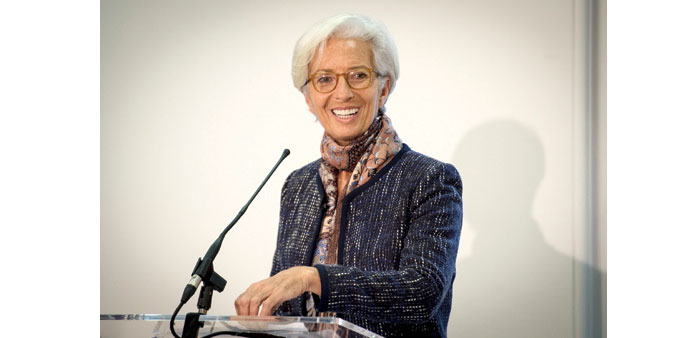Lagarde says the changes approved on Friday will “strengthen the IMF in its role of supporting global financial stability.”
Bloomberg
Washington
US lawmakers approved changes to International Monetary Fund governance that will give more of a voice to emerging markets such as China and India in exchange for greater congressional oversight of the fund.
The House and Senate on Friday passed a $1.1tn spending plan that includes language implementing the IMF reforms, which have been awaiting congressional ratification since 2010, a delay that spurred global criticism of the US President Barack Obama who supported the change and signed the bill on Friday.
Ratification also clears the way for the Washington-based fund to begin reviewing another round of changes that could give China and other emerging markets an even bigger voting share. The IMF’s executive board is expected to consider a timetable as early as January for the next review of the institution’s share system.
IMF managing director Christine Lagarde said the changes approved on Friday will “strengthen the IMF in its role of supporting global financial stability.”
“The reforms significantly increase the IMF’s core resources, enabling us to respond to crises more effectively, and also improve the IMF’s governance by better reflecting the increasing role of dynamic emerging and developing countries in the global economy,” she said in a statement.
The IMF’s executive board approved a plan in 2010 to increase the voting share of emerging economies and double the amount of permanent funding available to the Washington-based fund, which serves as a lender of last resort to countries that face capital shortfalls.
Some Republican lawmakers had previously said the shift would give too much influence to countries that don’t share US interests, while others questioned the need for international bailouts.
Emerging-market leaders had warned that the IMF would lose legitimacy if its voting structure didn’t reflect the growing economic clout of countries such as India and China. The delay may have helped push China to establish the Asian Infrastructure Investment Bank, a development lender similar to the World Bank.
Lawmakers imposed several conditions on their support for the reforms. The Treasury Department must push to repeal the fund’s so-called systemic-exemption policy, according to the budget bill. The policy allows the board to relax the IMF’s lending standards when a country’s default has major spillover risks. The board invoked the exemption in approving a bailout for Greece in 2010.
Congress must also approve any extension beyond 2022 of US participation in a credit line provided to the IMF during the financial crisis to increase its capital.
In addition, the US representative on the IMF’s board must report to lawmakers when voting in favour of any loans that exceed the fund’s normal limits.
China, the world’s second-largest economy, currently ranks sixth in voting shares at the IMF, behind the US, Japan, Germany, France and the UK. Under the 2010 plan, China would jump to third, while India would climb to eighth from 11th and Brazil would move up four spots to 10th.
The fund is primarily financed by shares, known as quotas, assigned to its 188 member countries. The proposal would double the number of total quotas, while rolling back by a corresponding amount the crisis-era credit line, known as the New Arrangements to Borrow.
Quota reform “sounds esoteric to many people. What it stands for around the world is American leadership,” US Treasury Secretary Jacob J Lew said in an interview with “CNN’s Fareed Zakaria GPS” that was to be aired later yesterday. “Things like approving quota reform mean we’re going to stay very strong on the world stage,” Lew said in a transcript provided by the network.
China’s central bank said in a statement on Saturday that it welcomes the ratification of the 2010 quota and governance reforms by the US Congress.
“Going forward, China will work closely with other member countries to support the IMF to continuously improve its quota and governance structure, to ensure that the IMF remains a quota-based and adequately resourced institution,” the People’s Bank of China said in the statement on Saturday.

